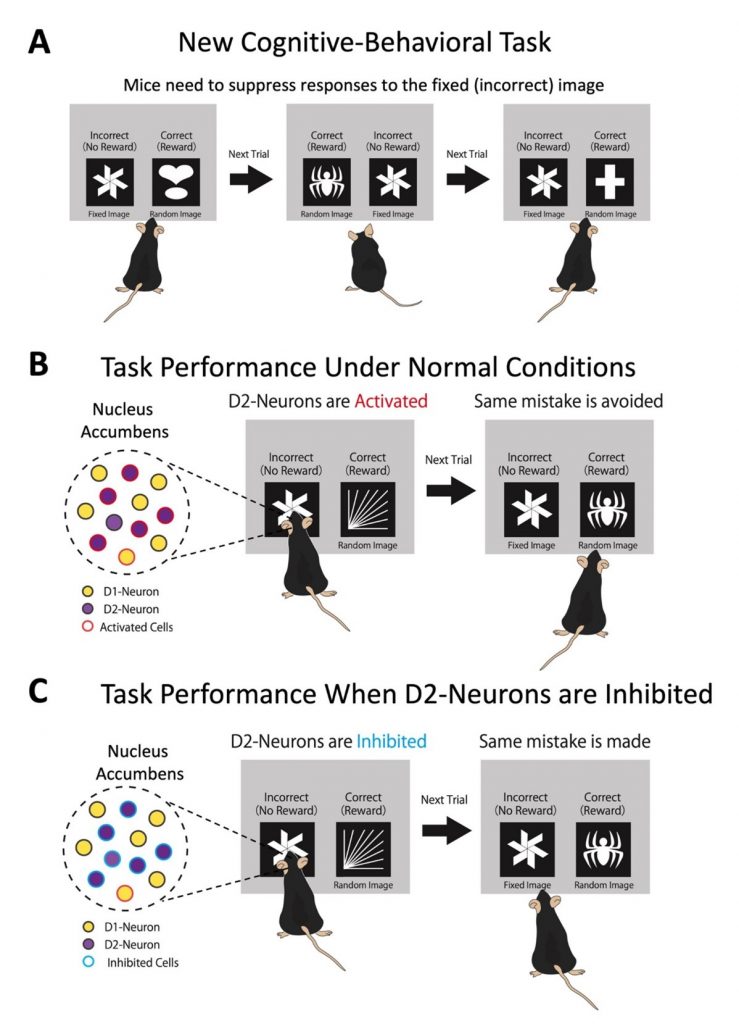![]()
ACHIEVEMENTSIPR The University of Osaka
-

- ACHIEVEMENTS
- From mistakes to mastery: the brain pathway that allows us to learn from our mistakes.
Press Release
2023.04.28
From mistakes to mastery: the brain pathway that allows us to learn from our mistakes.
Osaka University researchers reveal a brain pathway that signals when we have made a mistake and uses this information to improve future decision-making.
Osaka, Japan – The Nobel prize winning physicist Niels Bohr once said, “An expert is a (person) that has made all the mistakes that can be made in a narrow field.” This idea that to master a skill we must learn from our mistakes and avoid making them in future has long been recognized; however, the brain mechanisms and pathways that control this ability have been poorly understood.
In a recent study published in the scientific journal Nature Communications researchers from Osaka University, led by postdoctoral fellow Dr Tadaaki Nishioka under the supervision of Professors Takatoshi Hikida and Tom Macpherson, revealed a specific brain pathway that allows us to identify and learn from our mistakes to guide better decision-making in future. The team began by designing a new cognitive-behavioral task in which mice could only receive a sugar reward if they successfully learnt how to prevent making decision-making mistakes (see figure). Then, using a cutting-edge brain imaging technique they identified a specific group of cells (known as D2-neurons) in the nucleus accumbens, an area of the brain implicated in decision-making, that signaled when mice had made a mistake. Finally, using a genetic technique called optogenetics that allows cells to be temporarily “switched-off”, the team demonstrated that if signaling by D2-neurons was blocked during the part of the task when mice would ordinarily realize that they had made a mistake (i.e., when they discover the outcome of their decision), then mice were more likely to make the same mistake again in future.
“Our work is an important step towards understanding how the brain controls our daily choices and behavior.” said Tom Macpherson, a senior author on the project. “The identification of these cells as ‘mistake signalers’ may also help to guide new treatments for mental health conditions associated with impaired decision-making ability.”
The article, “Error-related Signaling in Nucleus Accumbens D2 Receptor-expressing Neurons Guides Inhibition-based Choice Behavior in Mice”, was published in Nature Communications at DOI: https://doi.org/10.1038/s41467-023-38025-3
Summary: The Nobel prize winning physicist Niels Bohr once said, “An expert is a (person) that has made all the mistakes that can be made in a narrow field.” This idea that to master a skill we must learn from our mistakes and avoid making them in future has long been recognized; however, the brain mechanisms and pathways that control this ability have been poorly understood.
We revealed a specific brain pathway that allows us to identify and learn from our mistakes to guide better decision-making in future.
Our work is an important step towards understanding how the brain controls our daily choices and behavior. The identification of these cells as ‘mistake signalers’ may also help to guide new treatments for mental health conditions associated with impaired decision-making ability.
Primary keyword: Health and medicine
Secondary keywords: Neuroscience, Optogenetics, Nucleus accumbens, Brain, Neurons

Figure: Signaling of mistakes by D2-Neurons improves future decision-making. License: Original content Usage restriction: Only noncommercial uses of the work are permitted. Credit: Tadaaki Nishioka, Tom Macpherson, Takatoshi Hikida
ResOU (https://resou.osaka-u.ac.jp/en) : Life Sciences & Medicine
Method of Research: Experimental study
Subject of Research: Animals
Title: Error-related signaling in nucleus accumbens D2 receptor-expressing neurons guides inhibition-based choice behavior in mice.
Journal: Nature Communications
Authors: Tadaaki Nishioka, Suthinee Attachaipanich, Kosuke Hamaguchi, Michael Lazarus, Alban de Kerchove d’Exaerde, Tom Macpherson, Takatoshi Hikida
DOI: 10.1038/s41467-023-38025-3
Funded by:
Japan Society for the Promotion of Science
Japan Agency for Medical Research and Development
About Osaka University
Osaka University was founded in 1931 as one of the seven imperial universities of Japan and is now one of Japan’s leading comprehensive universities with a broad disciplinary spectrum. This strength is coupled with a singular drive for innovation that extends throughout the scientific process, from fundamental research to the creation of applied technology with positive economic impacts. Its commitment to innovation has been recognized in Japan and around the world, being named Japan’s most innovative university in 2015 (Reuters 2015 Top 100) and one of the most innovative institutions in the world in 2017 (Innovative Universities and the Nature Index Innovation 2017). Now, Osaka University is leveraging its role as a Designated National University Corporation selected by the Ministry of Education, Culture, Sports, Science and Technology to contribute to innovation for human welfare, sustainable development of society, and social transformation.
Website: https://resou.osaka-u.ac.jp/en






